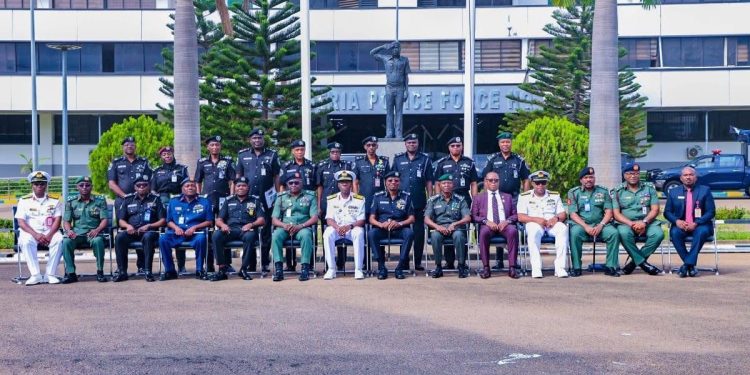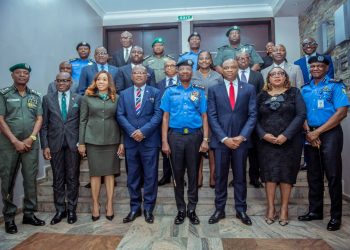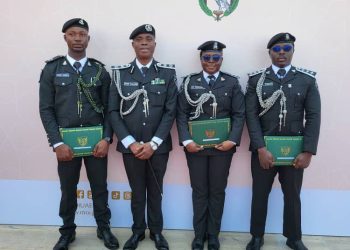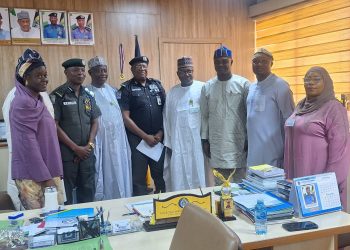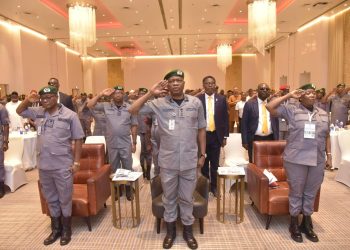By Nkechi Eze
The Inspector-General of Police, IGP Kayode Adeolu Egbetokun, on Tuesday, July 22, 2025, received the Commandant of the National Defence College (NDC), Rear Admiral J.O. Okosun, and his entourage, including directing staff and Nigeria Police Force (NPF) participants of Course 33, at the Force Headquarters in Abuja.
The high-level visit, held at the IGP Smart Conference Hall, brought together senior military and police officials, including the Deputy Commandant of the NDC, Major General K.O. Ukandu; senior directors and faculty of the College; members of the NPF Management Team; and other senior officers of the Nigeria Police Force. A key highlight of the event was the formal presentation of a research paper by the police participants of Course 33, titled “Emerging Technologies and Internal Security: Strategic Options for the Nigeria Police Force by 2035.”
According to the Force Public Relations Officer, ACP Olumuyiwa Adejobi, the paper presentation and collaborative exchange underscored the NDC’s central role in promoting innovative policy thinking and inter-agency collaboration to solve national security challenges.
In his remarks, Rear Admiral Okosun thanked the IGP for the warm reception, commending the NPF Course 33 participants for selecting a forward-looking topic that aligns with the College’s objectives. “One of our core mandates at the National Defence College is to build strategic thinking capacities among participants to develop innovative solutions to the country’s security challenges. I’m particularly pleased that your participants have chosen a theme that is not only futuristic but deeply relevant to the changing dynamics of internal security,” he said.
He emphasized the longstanding and mutually beneficial relationship between the NDC and the Nigeria Police Force, expressing optimism that the synergy would continue to deepen under the leadership of IGP Egbetokun. “The NDC and NPF have built a legacy of trust, cooperation, and shared strategic vision, and we are confident that this collaboration will yield even greater results in the years ahead,” he added.
Presenting the paper on behalf of the Course 33 participants, Deputy Commissioner of Police (DCP) D.B. Lamba outlined a strategic vision for integrating emerging technologies into police operations over the next decade. The roadmap proposed a phased implementation of institutional, legal, infrastructural, human resource, and sustainability reforms aimed at modernizing the Nigeria Police Force and strengthening its crime prevention, intelligence, and rapid response capabilities.
DCP Lamba explained, “Our research identifies artificial intelligence, drone surveillance, biometric databases, smart policing platforms, and big data analytics as key tools that the Nigeria Police must begin to integrate gradually into its core operations. The paper recommends a coordinated approach that involves both internal restructuring and external legislative support to drive implementation.”
In his address, the Inspector-General of Police congratulated Rear Admiral Okosun on his appointment as Commandant of the National Defence College and praised the NPF Course 33 participants for their rigorous and insightful presentation. He noted that the future of policing would require bold innovation and decisive investment in modern technologies.
“I must commend our participants for their deep intellectual engagement and their vision for the future of policing. Their paper is not only timely, but it provides a realistic framework for transitioning the Nigeria Police Force into a smart and future-ready law enforcement agency,” IGP Egbetokun stated.
He reiterated the Force’s commitment to embracing innovation and modern policing models. “We cannot afford to be reactive in this era of dynamic security threats. Technology must become the backbone of our crime prevention and response architecture. The recommendations in this paper will be carefully studied and incorporated into our broader reform and modernization agenda,” the IGP assured.


